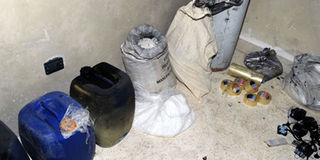UN team hopes to start disabling Syria chem arms soon

A photo released by the Syrian Arab News Agency (SANA) on August 24, 2013 shows bags and containers of what the Syrian government claims to be materials used to make chemical weapons discovered in Jobar on the outskirts of the capital Damascus. Experts overseeing the destruction of Syria's chemical arsenal hope to begin on-site inspections and the initial disabling of arms "within the next week," the United Nations said Thursday.
Experts overseeing the destruction of Syria's chemical arsenal hope to begin on-site inspections and the initial disabling of arms "within the next week," the United Nations said Thursday.
The joint mission of the UN and the Organization for the Prohibition of Chemical Weapons said it "has made encouraging initial progress" adding that documents handed over by Damascus on Wednesday "look promising."
"The team hopes to begin on-site inspections and the initial disabling of equipment within the next week, but this depends on the outcome of the technical groups established with the participation of Syrian experts," they said in a statement.
The two organizations, however, warned that "further analysis, particularly of technical diagrams, will be necessary and some more questions remain to be answered."
UN spokesman Martin Nesirky declined to provide further details to journalists, saying: "The technical experts need to study everything they are given very closely."
"There is clearly a good cooperation with the Syrian authorities at the expert level to try to understand the material provided to the advance team from the UN and OPCW," Nesirky added.
The OPCW-UN team of 19 disarmament experts arrived in Damascus on Tuesday.
They are overseeing the implementation of a UN resolution which orders Syria's chemical arsenal destroyed.
Resolution 2118 was passed after gas attacks on the outskirts of Damascus killed hundreds of people on August 21, an atrocity that prompted the United States to threaten military strikes on Syria.
The UN and the OPCW said joint technical groups were working on verification of information provided by Damascus, the safety of inspectors and "practical arrangements for implementing the plan" to eliminate Syria's chemical arsenal by mid-2014.
Earlier Thursday, the UN and the OPCW said experts had begun securing their work sites in Syria.
The team also considered "the health and environmental hazards which they may have to confront," said the earlier statement.
Experts face a daunting task, as President Bashar al-Assad's regime is understood to have more than 1,000 tonnes of the nerve agent sarin, mustard gas and other banned chemical weapons.




